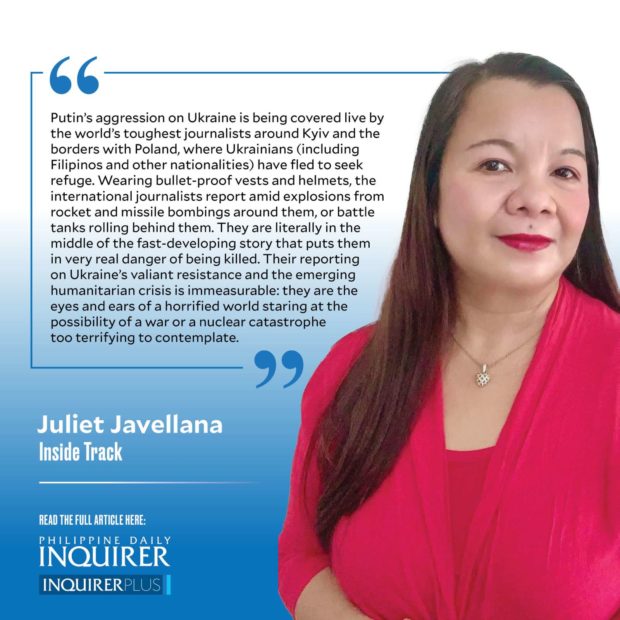Ukraine and journalists as noncombatants
In September 2012, my Inquirer colleague Imee Alcantara and I attended the 64th World Newspaper Congress held in Kiev. At that time, Kiev, the Russian name for the Ukranian capital, was commonly used. The city’s name is Kyiv in Ukranian language and, in light of the ongoing Russian invasion, is the more politically correct name.
As an aside, going to Ukraine from the Philippines around that time was an insane pursuit. Since Ukraine has stopped visa issuance in Manila, it required getting your visa in Vietnam, then going to Thailand for the flight to Ukraine. Why would a Filipino go to Ukraine, someone asked me on Twitter when I posted about this visa and flight conundrum.
To avoid the circuitous — and expensive — route, we sought assistance from Ukraine’s honorary consul general in the Philippines, who asked help from his counterpart in Japan, who in turn made representations for us to get our visa upon arrival in Kyiv. Instead of a visa, we carried four sets of letters including one from the Ukrainian consul in Tokyo and another from then Philippine Foreign Secretary Albert del Rosario urging Ukraine to reinstate the visa processing in Manila!
Needless to say, our “suspicious’’ credentials caused us to be held at the airport in Hong Kong and in Frankfurt, Germany, where we took the connecting flight to Kyiv. When we arrived at 2 a.m. at the Boryspil International Airport, we were boarded onto a van that took us to another building. The border police didn’t say a word and it was a distinct possibility that these two Filipino women traveling without proper documents could disappear at that point. When we were finally brought back to the empty terminal, our luggage had been packed with plastic in the unclaimed baggage counter. We were apparently luckier than other delegates. An editor from Thailand, for instance, was held for a day in Frankfurt.
There were debates at the World Association of News Publishers (WAN-Ifra) about the wisdom of holding its world congress in Ukraine, not so much because of the challenges of traveling there, but more about the issue that media in Ukraine was still largely unfree. But precisely for this reason, WAN-Ifra decided to bring the event to Kyiv, to send the message about the importance of press freedom and the role of journalists in society, as well as to offer moral support to our Ukrainian colleagues.
“We are going to Kiev to stand in solidarity with the local independent press, which struggles daily under great pressure, often in isolation,’’ then WAN-Ifra president, Jacob Mathew, explained.
Viktor Yanukovych, Ukraine president at that time, gave the keynote address before over 1,000 publishers, editors, and news executives from 90 countries around the world. In the middle of his speech, a dozen Ukrainian journalists staged a lightning protest, raising placards that said “Stop Censorship!” Yanukovych would be deposed two years later after the 2014 democracy protests in Kyiv’s Maidan Square. He was convicted of treason for trying to crush the pro-Western protests and for asking Russian President Vladimir Putin to invade Ukraine after his ouster and exile to Russia.
Now, Putin’s aggression on Ukraine is being covered live by the world’s toughest journalists around Kyiv and the borders with Poland, where Ukrainians (including Filipinos and other nationalities) have fled to seek refuge. Wearing bullet-proof vests and helmets, the international journalists report amid explosions from rocket and missile bombings around them, or battle tanks rolling behind them. They are literally in the middle of the fast-developing story that puts them in very real danger of being killed.
Their reporting on Ukraine’s valiant resistance and the emerging humanitarian crisis is immeasurable: they are the eyes and ears of a horrified world staring at the possibility of a war or a nuclear catastrophe too terrifying to contemplate. Their stories hopefully will help nations and peoples stand up for an independent Ukraine, and for freedom and peace in the world. To do that dangerous job, the journalists must live to tell the stories.
In a statement on Feb. 24, WAN-Ifra and the World Editors Forum urged maximum protection for journalists. They reminded Russia and Ukraine that, as signatories to the International Covenant on Civil and Political Rights, they must respect freedom of expression. “Journalists are civilians and as such should be treated as non-combatants,’’ it said.
WAN-Ifra said it was particularly alarmed by reports that Russian forces have allegedly drawn up a target list of journalists. “At this extremely dangerous moment, we call on all parties to this escalating conflict to do everything in their power to prioritize the safety of journalists and respect the role of the press,” WAN-Ifra CEO, Vincent Peyrègne, said in a statement.
Nearly 10 years since WAN-Ifra staged that eventful world congress in Kyiv, the organization once more stands in solidarity with the free, independent, and courageous media in Ukraine and the civilized world reporting on the precipice of war.
* * *
Juliet L. Javellana is associate publisher of the Philippine Daily Inquirer, a member of WAN-Ifra.





















